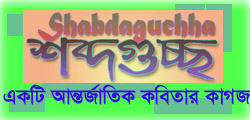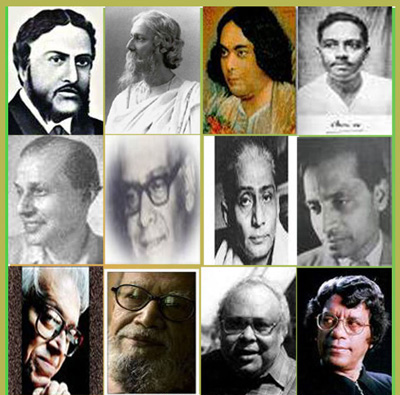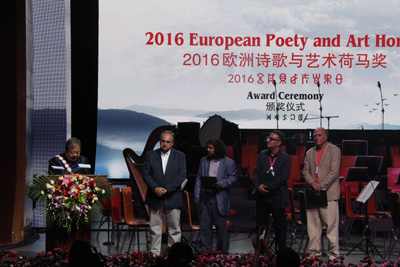 |


|

সব গ্রন্থই পবিত্র
সাহিত্য২: আমার বাবা বুদ্ধদেব বসু সাহিত্য৩: কালীকৃষ্ণ গুহ'র কবিতা সাহিত্য৪: কবিতা ও গল্প সাহিত্য৬: কবিতা সাহিত্য৮: কবিতা সাহিত্য১৩: কাব্যালোচনা সাহিত্য১৪: কাজী ফয়সল আহমেদ-এর কবিতা সাহিত্য২২: তিন প্রকার ছন্দ সাহিত্য২৩: ক্যাফের কবিতা সাহিত্য২৪: কবিতা সংবাদ সাহিত্য২৫: আন্তর্জাতিক কবিতা উৎসব সাহিত্য২৭: সভ্যতায় নারী: অনাদৃত অবদান--পূরবী বসু সাহিত্য২৮: গল্প: পিপাসা--হাসানআল আব্দুল্লাহ সাহিত্য২৯: গল্প: জন্মদিনের কড়চা--নাজনীন সীমন সাহিত্য৩০: সাক্ষাৎকার |
Interview
An Interview with Hassanal Abdullah
 An Interview with Hassanal Abdullah By Peter Thabit Jones, editor Seventh Quarry Peter Thabit Jones: When did you start writing poetry and do you initially write a new poem in Bengali or English? Hassanal Abdullah: I started writing poetry when I was in the eighth grade. As you know, my father died in the Bangladeshi Liberation War against Pakistan in 1971. I was then only four years old. Since my dad was the only bread earner of the family, my mom, with me and my two sisters, moved to her father’s house, which was in a village of Gopalganj district,. I went to a village school there. One afternoon, during the monsoon time, started a sudden storm while I was with my house tutor, who was from the same village and a few years older than me, sitting face to face across my study table. He just closed the book, probably the math text or English, I don’t remember it now, and asked me to write a poem on storm. I don’t know what went through my mind, I immediately started writing a poem with no hesitation as if I knew how to write a poem. That was the first poem I wrote with end rhyme. The next day, I wrote another, and another in the following day. To me it was a word-puzzle to unfold each time I started writing a poem. And interestingly, my first listener was my mom, who used to remark “you wrote this!” with a flash of light in her eyes, that motivated me to write a new one. Later, while I was a student at the University of Dhaka, I realized those poems I wrote in my high school years were nothing but a few clusters of novice words. Nevertheless, they guided me to enter into the poetic world. I initially write a poem in Bengali. Let’s put it this way, I am a Bengali poet. I translated some of my poems into English. I translated many Bengali poets into English, and many poets from English or their English translation into Bengali. Interestingly, nowadays, as I am spending more time with American poets and poets of the other parts of the world, I realize that, sometimes, I write a poem or two directly in English. For an example, When God is Dead, a well read poem, was first written in English. Then I made a Bengali version of it. You will also find three poems in the present issue of Shabdaguchha (Issue No. 67/68) originally written in English. Peter Thabit Jones: What have been the main influences on your writing? Hassanal Abdullah: People, their ordinary lives, experience of my own, my hardship of growing up, and many social and political nonsense or sense going around us. All, all of these are my inspiration of writing a poem. Therefore, it is hard to find a single most influence. I would rather say, all the good poets I read are my influences. To name a few, I would say Shakespeare, Petrarch, Dante, Milton, Michael Madhusudan Dutt, Baudelaire, W. B. Yeats, Ezra Pound, T. S. Eliot, Rabindranath Tagore, Jibonananda Das, Dylan Thomas, Paul Celan, Nazim Hikmat, Tomas Tranströmer, Derek Walcott, Seamus Heaney, Shamsur Rahman and Stanley Kunitz. Peter Thabit Jones: How important is form in your approach to writing a poem? I am thinking of the new sonnet form you created. Hassanal Abdullah: I already mentioned Petrarch and Shakespeare and we all know that there are two major sonnet forms, Petrarchan or Italian Sonnets and Shakespearian or English sonnets. I first came to know the Italian sonnets by reading Michael Madhusudan Dutt, a Bengali poet of the nineteen century. Dutt lived in France for some time in his life where he came across Petrarchan Sonnets and introduced it into Bengali by writing 102 sonnets. Though, not all of them were written in the correct from, he was the one who wrote the first sonnet in Bengali. Later, Tagore and his successors of the thirties and the fifties wrote sonnets. Since I love to play with forms, I started writing sonnets in both forms in the early nineties. My fourth book, Sonnets and Other Poems, included 30 of such sonnets. But, when I was a student at Hunter College, New York, studying Number Theory to complete my bachelor degree in mathematics, I started rearranging the rhyme, and one day, I thought why there be eight and six line stanzas, why not making them seven-seven? I came up with three or four different rhyme patterns and scratched them in my math notebook. Finally crossed everything out but one: abcdabc efgdefg, thinking of ellipses that have two foci on opposite side of the axis, such as the ‘d’ rhyme sitting in the middle of both stanzas. I showed it to one of my classmates, who happened to be from Japan and used to write poetry too. He commented, “Start writing. One day people will call them Abdullahan Sonnets.” On April 29, 1995, I wrote the first sonnet using my own form and ever since, I became addicted to it. To this date, I wrote 210 such sonnets. The first edition of the book, Swatantra Sonnets, this is how the sonnets are called, was published in 1998 with 100 sonnets. The 2nd and 3rd editions were published in 2004 and 2014, respectively, with 130 and 203 such sonnets. Yes, at times, rhyme, rhythm, and form are important to me, though I love to recreate them. For an example, Nakhatra O Manusher Prashad (2007), a 304-page epic I wrote on the scientific understanding of the relation between human beings and the universe, was written in prose form, in which I used the akkrbritto Bengali meters in free hand combinations. As I know, some poets, such as Caroline Gill from Welsh, write sonnets using my form. I have recently noticed, two young Bengali poets also adapted Abdullahan Sonnets. So far, I translated about 50 of these sonnets into English preserving the rhyme scheme. Peter Thabit Jones: I have been lucky enough to participate in a few of the wonderful Bengali International Festivals you organize with Stanley H. Barkan, our mutual publisher, in New York. What, if any, would you say has been the influence of American poetry on contemporary America-based Bengali poetry? Hassanal Abdullah: Modern Bengali poets were greatly influenced by English modernists. Critics say some of Tagore’s poetry have been influenced by Irish songs. As a romantic, he was a great follower of the European romantics. On the other hand, it is really interesting to see that T. S. Eliot’s The Westland was influenced by Mahabharata. Therefore, historically, as the East was influenced by the West, the West also, to some extent, was influenced by the East. Now, the Bengali poets living in the US, especially me, since I would not feel comfortable speaking about others, I would say I am greatly influenced by many of the great poets from both the East and the West. Not that I write the way they did, but I always move by a fine piece of work. I learn from it, I try to digest it and at time when it comes to my own writing I apply the knowledge of how the body of a particular poem could develop. To be frank, I would not have been able to write the epic, Nakhatra O Manusher Prashad, unless I would have come across two books: Derek Walcott’s Omeros and Kazantzakis’s The Odyssey: A Modern Sequel, though my epic deals with completely a different topic. I must also admit that out of the American poets, Stanley Kunitz and John Asbury, and of the Europeans, Seamus Heaney and Tomas Tranströmer moved me a lot. Peter Thabit Jones: What aspects of a poem do you hope to retain in the act of translation from Bengali to English or English to Bengali? Hassanal Abdullah: Before I answer this question, I have to say that I believe translation itself is a group work, especially when one has to translate to a language that is not his mother tongue. And I do not think that lateral translation is worth doing, though it is my job to stay as closer to the original as possible. When I translate from Bengali to English, I first try to make a draft keeping the original in front of me. In a few days, I come back to the translation and polish it without even looking at the original. This time, I try to make sure that the translation turns into a poem in English. In this process, I might loose or gain a bit, but I am happy with it. After a few revisions, I send it to my great friend, Stanley H. Barkan, a poet and publisher, whom you mentioned earlier, to edit the translation. Many a time, Stanley and I sit together with the original in my hand to complete the editing process. Neither Stanley nor I believe in poetry is “what’s lost in translation.” The process is almost the same when I translate from English to Bengali, except I do not need an editor for it. I edit the work by myself. But, if anyone else other than me translate my poems into English, I try to work on it before I send it to Stanley or anybody else. So, to answer your question, I would say the poem is still the same, but it may sound different in the target language, since each language has its own flavour. Peter Thabit Jones: What are your future plans for your writing? Hassanal Abdullah: I am a 24-hour poet. Along with writing poetry and translating it, I also write novels, short stories, critical essays, plays, and lyrics. I once wrote a travelogue too. I wrote a book on Bengali meters and rhythms, which is a college text now. So, my future plan is to keep on writing, though my primary goal is to “globalize Bengali poetry,” which I have been doing by not only through my own poetry and translation, but also by editing and publishing, Shabdaguchha, an international bilingual poetry magazine. I vow to continue it. At this moment, I am working on a novel in English and translating my sonnets. I am also looking for a publisher of Contemporary Bangladeshi Poetry, an anthology on my translation of the poets of Bangladesh. [From Seventh Quarry, Welsh, 2016]  |
Contact Us